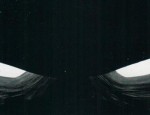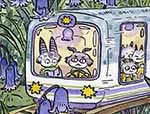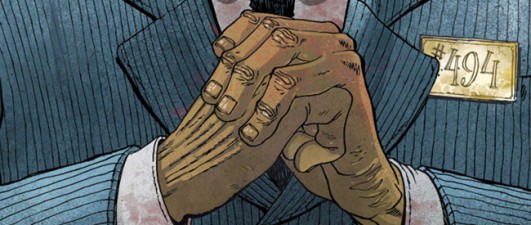
Finding your voice as a writer is often thought of as the most challenging aspect of successfully publishing your work. In comics, with its monthly schedule and plethora of titles overcrowding the shelves, it can be exponentially more difficult to discover a voice capable of shouting loud enough to be heard above the deafening roar of the mediocre.
In his latest creator-owned work from the neophyte Titan Comics, UK phenom Si Spurrier taps into timeless themes of love, death, and the in-between. First published across the pond by Judge Dredd Megazine, Numbercruncher chronicles one man’s bid to cheat death and spend another lifetime with his true love. Positing an afterlife governed by the stringent laws of accounting, Spurrier and collaborator P.J. Holden have succeeded in building a book unlike any other on the shelves today – a love story of truly epic proportions almost certainly doomed to failure.
Spurrier, as gracious as he is forthright and downright funny, spoke to Broken Frontier about the mechanics of his peculiar brand of the afterlife and finally bringing his vision to North American readers.
BROKEN FRONTIER: As far as originality goes, it’s pretty safe to say there isn’t another comic like Numbercruncher on the shelves today. In yourafterword, you say the idea came to you fully formed. Having said that, the afterlife mechanics of the series is intricate and perhaps more importantly complete. Once the idea struck, how much more work was involved in realizing it within the confines of a comic book?
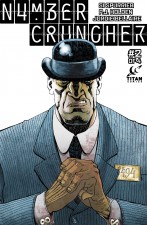
SI SPURRIER: I guess… it doesn’t really feel like work. I tend to find the adding-detail stage is the fun part.
Like, whether your brain just arbitrarily shat out this intricate crystalline nugget of a story (as with Numbercruncher) or you’ve been agonising and honing and bleeding over the plot for months, either way that initial “structure” part of the process can be exhausting. Lots of thought with nothing to show for it but some intangible psychic think-gristle or – at the very most – a couple of spidery flowcharts.
Whereas the burnished cobwebby fluff, which you hang on the bony corpse of the structure, is all about madcap creative shits’n’giggles.
In Numbercruncher’s case, the idea, when it occurred, involved all the plot-centric twists and turns, the character-perspective stuff, and a few vital details. Those in their turn began to suggest an overall aesthetic, a vague ballpark for locations and character-types and so on, with each subsequent thing informed and inspired by the – more vital – thing before it. Before I knew it I was cackling like a demon-toddler, filling an abstract numerical pseudo-reality with golfcarts and spherical typewriters.
Brains are weird.
Further along those lines, what part did P.J. Holden play in depicting the afterlife in the series?
He has photos of me doing something unspeakable to a unicorn. He takes full credit for everything.
Actually, pretty much all the exciting trippy noteworthy stuff you’ll see in Numbercruncher comes from P.J.’s pen. It’s all very well me saying something like “we’re between the scenes of reality! Everything’s made out of mathematics!” but as far as useful visual direction goes that’s up there with me describing how characters’ breaths might smell.
PJ’s taken some very surreal starting points and turned them into a world which not only retains its inherent trippy weirdo magnificence, but manages to look functional and cohesive. And pulls off the insane feat of looking astonishingly impressive and fucking boring all at once. Masterful stuff.
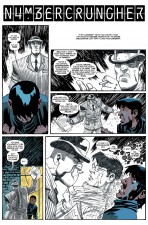 How important to the final product was it to have the benefit of a dry run in Judge Dredd Megazine?
How important to the final product was it to have the benefit of a dry run in Judge Dredd Megazine?
I’m not sure I’d put it in quite those terms – at the time we treated the Megazine iteration as the “Thing Of The Thing”, if that makes any sense. Besides working with our pals at 2000AD, and benefitting from the skills of unbeatable graphics-droid Si Parr, the single greatest benefit was simply that we got paid. A small page-rate – all for the privilege of creating a comic to which we retained all the rights – made an incredible difference. We could afford to take the time to do something personal and important rather than working just to pay the bills.
But yeah: when the possibility arose of Numbercruncher getting a wider airing with Titan we naturally found ourselves thinking about what little tweaks and polishes we might make, what we might add and subtract, how we might improve things. We always vaaaaguely had in mind that the “real world” scenes might end up getting coloured, á la A Matter of Life and Death, so bringing-in a colourist was a no-brainer. That we managed to entice no less a talent than Jordie Bellaire onboard was beyond all expectation.
Our letterer, Si Bowland – one of the best in the biz, IMO – was happy to field all my obtuse tinkerings and tweakage, and PJ gamely produced a set of original art – sometimes full pages, sometimes halves cleverly inserted between others – to soften out kinks and tune-up some of the pacing, bringing us up to the current 4x22pp definitive edition.
Obviously, the accounting profession figures heavily in your version of the afterlife. What is it about our perceptions of faith and religion that lent itself to an easy parallel in your story with making sense out of columns of numbers?
Worth noting – Numbercruncher isn’t really about Mathematics at all… any more than (say) Hellblazer is about the fiddly cabbalistic details of spellcasting. It’s the canvas, not the paint, and not something you need to be intimately knowledgeable about in order to enjoy.
Anyway… apropos what I was waffling about before, the numbery-slant was one of the things which was pretty central to the original idea, and which became more and more important the further we pushed into the territory of theme and then detail. Obviously I don’t want to spoil things, but the nuts-and-bolts of the story require the presence of rules and regulations, the character arc requires a hefty dose of smart-arsed manipulation, and the thematic core relies on the notion of everyone and everything heading towards something…
(It’s what the Divine Calculator calls “ultimate complexity” and Bastard Zane rather more prosaically calls “the biggest number there is”. It’s a sort of reverse entropy, which – weirdly – I’ve since discovered in similar forms at the heart of various esoteric philosophies. I’ve just been reading Shantaram. Worthwhile.)
…anyway, all of those things when put together just naturally nudge the imagination – by necessity – towards something ordered, regulated, precise. 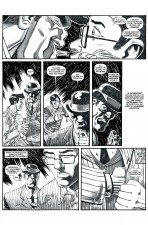 Mathematics is a simple leap.
Mathematics is a simple leap.
From there? Well, what does an afterlife which runs on regulating numbers look like? What do the people who work there look like? How do they do their jobs? Do they like it? And, if you want those people to be the antagonists, how do you invest them with a sense of nastiness?
Answer: accountants, tax collectors and bailiffs. You keep asking yourself these questions and before you know it you realise the fucking thing’s writing itself, and you’re hip-deep in Faustian pacts and super-horrible violence.
The best part is when the detail feeds back and infects the plot or the theme. The final part of Numbercruncher turned into something… well, not unexpected, because it was all meticulously formed when the idea hit me… but something very differently-nuanced than I expected, as a result.
I’m way more a pragmatist and a rationalist, I like to think, than a soppy airy-fairy esotericist, but in Numbercruncher it all kind of – hah! – crunches together, in what I hope is a very cunning way. Can’t say much more than that without ruining it.
Is the Divine Calculator really God or what millions of Christians might assume is God? Does God as he or she or it exist in the afterlife as depicted in Numbercruncher? If so how does that reconcile with what seems to be popular notions of reincarnation?
Ha! Not touching that one with a barge pole.
All right… maybe a gentle prod.
Look, faith is… well, in this context, it’s not my problem. Faith only becomes an issue worthy of debate when someone decides to impose their version of super-reality (or lack thereof) on other people, especially if it’s done in a humourless or forceful way, and especially especially if those people are too young or stupid or brainwashed to think for themselves.
Numbercruncher’s about a bunch of things, but it’s absolutely not about whether a charismatic epileptic was nailed to a plank 2000 years ago or not, whether it’s morally wrong to eat delicious, delicious bacon, or whether the correct succession of sectarian authority should follow the lineage of a tribal schismaticist’s son or of his protégé. If we’ve done our job right it won’t affect your enjoyment of the story in the slightest whether PJ and I are god-botherers, faith-dodgers, anti-establishment iconoclasts or whatever.
Which is the long way of saying: we establish the rules of the story-world at the get-go, we set the pieces spinning, and that – along with the ability to pay attention and a vaguely functioning brain – is all you’re going to need to enjoy this book.
There’s an old saying that warns against discussing politics and religion with your co-workers. How do you suggest one raves about Numbercruncher, then? Religion and faith in the afterlife can be very sensitive subjects, especially in our current polarized society.
Was there ever a moment in the development of Numbercruncher when you said, “This is going to piss some people off.”? Or am I making a mountain of a molehill?
The latter, I think. That or I’m completely out of touch with how near-sighted and wall-eyed indie comics readers are. I mean… I like to say that PJ and I set-out intending to create something smart which doesn’t treat readers like dummies… but honestly? There’s nothing in Numbercruncher which will confuse anyone with a regularly-used brain.
Numbercruncher packs in a lot of information and a lot of action, and we don’t pause to say everything three times in case you missed it… but that’s not being smart; it’s just Not Being Dumb. As for politics and religion, we’re not trying to proselytize or decry any nuts-and-bolts belief system already in existence, because the whole point is that all the “Karmic Accountancy” stuff in the story explicitly takes place Behind The Scenes Of Reality. Gods, believers, non-believers and all. The fine detail of religion simply isn’t relevant to what this story’s about.
Possibly…? Possibly it’s just that we’re so used to an Entertainment diet of anodyne take-no-risks-lest-thee-offend-one-shrieking-fundamentalist dross that something like Numbercruncher’s notable. But… I doubt it. That’s not really what we’d choose to have it “known” for, anyway. The idea that you can’t write stories which touch on themes of mortality and metaphysics for fear of offending people? Arsebleed and fuckflaps to that. One flick through a Thor comic should cause way more ontological discomfort to any overly-sensitive modern Abrahamic monotheist worth their salt than anything you’ll find in Numbercruncher.
As for how you talk about Numbercruncher to your co-workers without offending their sensitivities? You get a new job with less pitiful co-workers. And steal the photocopier on the way out.
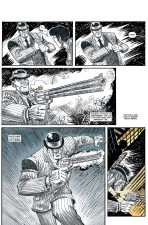 Romance also figures heavily in the subplots of Numbercruncher. Why was it important that in some way romantic love drive the plot?
Romance also figures heavily in the subplots of Numbercruncher. Why was it important that in some way romantic love drive the plot?
All just part of the tangled initial idea, really. I’ve always wanted to write a love story, but – because I’m a bit of a contrary prick – it automatically got turned upside down, set across multiple lifetimes, absolved from the whole notion of physicality and told from the point of view of the unromantic bad guy. Two wonderful, special things arose as a result: 1) the romance at the heart of it all became purer, more profound and more ironclad. And 2) the unromantic bad guy turned out to have a weird sort of ragged romance all of his own.
Bastard Zane (already) has one of the most recognizable and distinctive voices in comics in recent memory. What was the inspiration for the character and why did you choose to tell Numbercruncher from his POV? After reading the first issue, I’m not sure who I’m really cheering for, Bastard Zane or the Mathematician. Who do you see as the actual hero of your story?
For structural reasons, I knew it simply wouldn’t work for the whole story to be told through the eyes of the loved-up Romeo character. You’ll start to understand why that should be the further into the story we get, but it has to do with preserving certain mysteries and playing-up his enigmatic brilliance. So it made sense to see things from the opposite view. Can you tell a love story from the POV of the obstacle? I didn’t know, but it’s the sort of deliberately-obtuse challenge those of us who got into comics via 2000AD automatically gravitate towards.
‘Course, even if you’re telling a story from the POV of the bad guy you want people to relate to him, to feel for him, to feel sorry for him when things go bad. So from the get-go there was a very fine line to tread: we wanted people to be nebulously rooting for the Loving Couple, because – ya know – Reasons, but we also wanted people resonating with the poor lug who’s been sent to split them up. I’ve always had a soft spot for the Big Dumb Thug character – the Marvs and Goons of the world, who you can’t help liking for their sheer monodirectional simple-minded purity, even if they’re shitheads of the worst stripe – so that felt like a good, fun fit. Bastard Zane just stepped fully formed into the niche the needs of the story had created for him.
(In fact, that’s pretty much how everything in Numbercruncher happened. One thing always led to another.)
Who’s the hero? I don’t know, really. Their aims are both pretty justifiable. The mathematician is so in love he’ll break the rules of existence just to be with his soulmate, but he can also be a bit of a smug prick. Zane wants to escape from an eternity of mundane paperwork, but is basically a horrible person. Both of them are on a course towards redemption, peace, self-knowledge, etc. About all you can say with any certainty is that the prick behind it all – the Divine Calculator – is a truly dreadful piece of work.
So, yeah. One bad guy, two opposing protagonists, a vast ocean of love, an even vaster ocean of time, and a distinct lack of heroes. Ahhh, comics.
The Mathematician cheats the Divine Calculator for love, so just for shits and giggles…What would you do for love?
I would do anything for love. I would do anything for love. I would do anything for lo-ove…
But I won’t do that.
Numbercruncher #2 goes on sale August 21, 2013 from Titan Comics.






